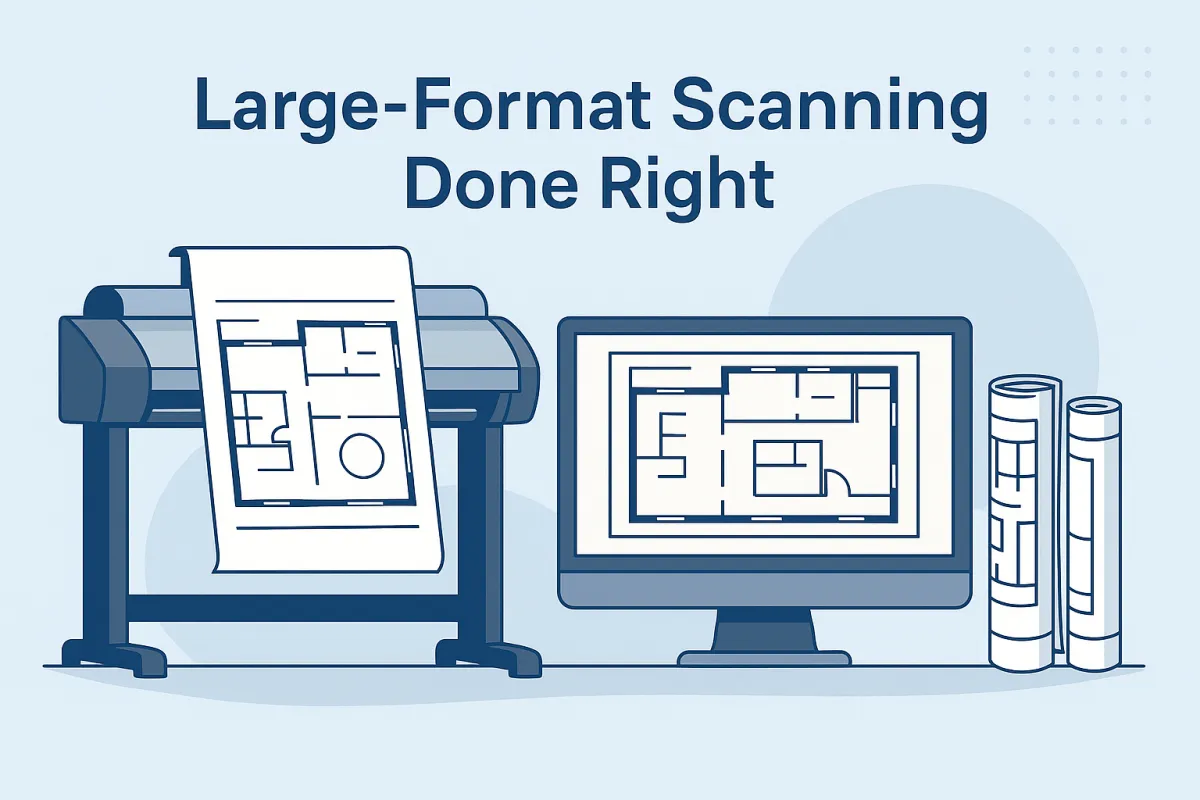
Large-Format Scanning Done Right: Blueprints, Maps, and Oversized Drawings
By: USA IMAGING, Inc.
When it comes to document scanning, not all projects fit neatly into a letter-sized box. Some of the most valuable documents our clients bring us are oversized—blueprints, engineering drawings, maps, and historical plans that simply can’t be handled by a standard office scanner. These large-format materials require a specialized process, one that balances scale, accuracy, and detail preservation to ensure that every line and annotation is captured with precision. At USA IMAGING, Inc., this is where we excel.
Why Large-Format Scanning Matters
Large-format documents are more than just bigger pieces of paper—they are working tools. For architects, engineers, surveyors, and city planners, a small error in scale or missing detail can translate into costly mistakes in the field. Historical maps and records, often fragile and one-of-a-kind, need to be preserved without damage while still being made digitally accessible. Without the right equipment and expertise, these documents are at risk of distortion, fading detail, or even permanent physical damage.
Specialized Equipment for Oversized Projects
Unlike desktop scanners, our large-format scanners are built to handle documents up to several feet wide. These advanced systems don’t just “shrink” the content; they maintain precise scaling so measurements remain accurate in the digital file. They also use gentle feeding mechanisms or flatbed options for fragile documents, ensuring that delicate maps or aging drawings aren’t torn, crumpled, or smudged in the process.
High-resolution settings are key. Depending on client needs, we can capture files at 200, 300, or even 600 DPI to preserve fine details like annotations, grid lines, or handwritten notes. For archival projects, we often recommend TIFF format for long-term preservation, while PDFs are common for day-to-day reference and collaboration.
Accuracy That Professionals Depend On
Every large-format scan goes through rigorous quality control. We check scale accuracy, line sharpness, and text clarity to ensure the digital version mirrors the original. This is especially critical for architectural or engineering drawings where one small measurement error could cascade into costly design flaws. Our systems are calibrated to avoid skew, stretching, or warping—issues that can easily occur if oversized documents are scanned improperly.
Indexing and Digital Usability
Digitizing a blueprint or map is only half the process—making it usable is the other half. At USA IMAGING, Inc., we provide indexing that allows clients to quickly find the exact drawing they need without digging through physical storage. Whether by project number, client name, location, or date, digital indexing makes oversized documents instantly accessible.
We can also apply OCR (Optical Character Recognition) where appropriate, so even annotations or text labels within a drawing can be searched digitally. This transforms static images into functional business tools, enabling faster collaboration and decision-making.
Real-World Impact
For one local engineering firm, scanning decades’ worth of rolled blueprints meant more than just clearing out storage space. It meant project managers in multiple offices could instantly access the same set of plans, eliminating shipping delays and physical handling risks. For a city planning department, digitizing maps preserved irreplaceable historical records while also enabling modern GIS teams to integrate scanned maps into digital systems for analysis.
The Professional Difference
Attempting large-format scanning in-house often means relying on piecemeal solutions like photographing drawings or forcing oversized paper through unsuitable scanners. The results are usually distorted, incomplete, or simply not professional quality. At USA IMAGING, Inc., we’ve invested in the right equipment and developed proven processes that guarantee accuracy, detail, and preservation for every project—whether it’s one oversized map or thousands of engineering plans.
Contact us: 858-513-6565 or request a quote.
